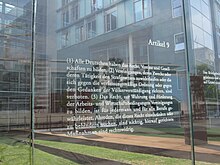Freedom of association
Freedom of association , the right to join together in common purpose and objectives and these to strive together ( freedom of association , right of association ). It is one of the basic rights . Freedom of association also exists in its negative form: everyone has the right not to join a group or association or to withdraw from such a group.

Germany
In Germany, freedom of association is guaranteed in Article 9 of the Basic Law (GG), a distinction being made between the general freedom of association under Article 9 (1) of the Basic Law and the freedom of association under Article 9 (3) of the Basic Law.
text
(1) All Germans have the right to form clubs and societies.
(2) Associations whose purpose or activities are contrary to criminal law or which are directed against the constitutional order or the idea of international understanding are prohibited.
(3) The right to form associations to maintain and promote working and economic conditions is guaranteed for everyone and for all professions. Agreements that limit or attempt to hinder this right are void, measures aimed at this are illegal. Measures in accordance with Articles 12a, 35 Paragraphs 2 and 3, Article 87a Paragraph 4 and Article 91 may not be directed against industrial disputes that are waged to safeguard and promote the working and economic conditions of associations within the meaning of sentence 1.
Protection area
The general freedom of association under Article 9 (1) of the Basic Law is a basic German right , and consequently only applies to citizens of the Federal Republic of Germany . Citizens without German citizenship are only entitled to the basic right of general freedom of action for matters relating to free association . In contrast, is freedom of association in accordance with Art. 9 para. 3 GG to everyone, and therefore also for foreigners, guaranteed.
All associations are also bearers of general freedom of association, regardless of their legal capacity. The association must have its legal seat in Germany or other EU countries, otherwise it can only invoke the general freedom of action.
Religious freedom of association is assessed as part of religious freedom (cf. the Baha'i resolution ).
Intervention
State interference with freedom of association is conceivable from the foundation to the dissolution stage. The regulations that types of the association (oHG, AG) determine in the first place do not interfere.
justification
Art. 9 para. 1 GG is not expressly subject to legal reservation. Art. 9 para. 2 GG, on the other hand, contains a prohibition of certain associations and, according to h. M. is not viewed as a reduction in the scope of protection, but as a constitutional justification for an interference. Ultimately, then, it is a qualified legal reservation. The ban on associations is based on the provisions of the Association Act .
Further reasons for prohibition than those in Article 9 (2) GG are excluded.
France
In France, freedom of association is guaranteed by Article 2 of the law of July 1, 1901 . It applies to all people regardless of their nationality. According to Art. 3 of this law, freedom of association does not apply to activities that are contrary to the law or morality, or which are contrary to the territorial integrity of France or the republican form of government.
Switzerland
In Switzerland , freedom of association is guaranteed by Article 23 of the Federal Constitution . Only associations that pursue an ideal purpose fall under the freedom of association. Associations with an economic purpose are only protected by economic freedom.
Art. 23 Federal Constitution
(1) Freedom of association is guaranteed.
(2) Everyone has the right to form associations, to join or belong to associations and to participate in the activities of associations.
(3) Nobody may be forced to join or belong to an association.
International regulations
Freedom of association and the right to collective bargaining are among the basic principles that determine the self-image and actions of the International Labor Organization . Two of the eight core labor standards relate to this issue:
- Convention 87: Freedom of Association and Protection of the Right to Organize, 1948
- Convention 98: Right to Organize and Collective Bargaining, 1949
Art. 11 of the European Convention on Human Rights contains freedom of assembly and association, as does Art. 12 of the Charter of Fundamental Rights of the European Union .
literature
- Bodo Pieroth , Hans Jarass : Basic Law of the Federal Republic of Germany Comment . 13th edition. CH Beck , Munich 2014, ISBN 978-3-406-66119-8 .
- Christoph Gröpl , Kay Windhorst , Christian von Coelln : Study Commentary GG . CH Beck , 2013, ISBN 978-3-406-64230-2 .
Individual evidence
- ↑ a b c Bodo Pieroth / Hans Jarass: Basic Law for the Federal Republic of Germany - Commentary , 2014, pp. 301-302.
- ↑ BVerfG, decision of October 9, 1991, Az. 1 BvR 397/87, BVerfGE 84, 372 , 378.
- ↑ BVerfG, judgment of June 10, 2009, Az. 1 BvR 706/08, 1 BvR 814/08, 1 BvR 819/08, 1 BvR 832/08, 1 BvR 837/08, BVerfGE 123, 186 , 237.
- ^ A b Bodo Pieroth / Bernhard Schlink : Basic rights. Constitutional Law II CF Müller; 26th edition, Heidelberg 2010, ISBN 978-3-8114-9751-1 , p. 199, Rn. 807, 808.
- ↑ Freedom of association and the right to collective bargaining ( Memento of the original from August 18, 2014 in the Internet Archive ) Info: The archive link was inserted automatically and has not yet been checked. Please check the original and archive link according to the instructions and then remove this notice. on "Wiki Good Work"